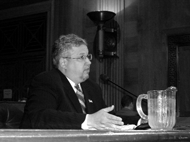Whistleblower protector refuses to accede to gay job-protection policy
A White House appointee responsible for ensuring fair employment practices testified on Capitol Hill on May 24 that gay federal employees have no job protections that ensure that they will not be dismissed because of their sexual orientation, said Scott Bloch, director of the Office of Special Counsel (OSC), an employment watchdog agency.
“We are limited by our enforcement statutes as Congress gives them. The courts have specifically rejected sexual orientation as a status protection under our statutes,” Bloch told Sen. Carl Levin, a Michigan Democrat, during his testimony before a labor subcommittee. “Far be it from me to exceed my authority and make law.”
Bloch was called before the Management, Federal Workforce and the District of Columbia subcommittee, chaired by George Voinovich, an Ohio Republican, to answer charges that he has reorganized his agency to get rid of internal critics, inappropriately dumped pending cases and failed to guarantee the rights of gay federal employees.
In 2003, the Senate voted unanimously in favor of Bloch’s appointment.
Shortly after Pres. George W. Bush appointed him as director, Bloch removed all references from the agency’s Web site, training materials and complaint forms indicating that sexual orientation was a category protected from employment discrimination.
Only when pressed by members of Congress did Bloch indicate he had undertaken a review of the applicable statutes, but believed that sexual orientation was protected only when a specific action—such as attendance at a gay pride event—was the reason for someone losing their job.
Congressional complaints about Bloch’s action grew so insistent that Bush issued an order in March stating his intent to continue the policy enacted by his Democratic predecessor, Bill Clinton, prohibiting discrimination against federal employees based on sexual orientation. Bush said that he expected all federal agencies to continue to enforce this policy.
Soon afterward, Bloch began a major reorganization of his office, ordering 12 employees—10 percent of the OSC staff—to an existing field office in Oakland and a newly created one in Detroit. The 12 were given 10 days to decide to move or resign from their positions.
At the time, Bloch claimed the reorganization was the result of lengthy staff discussions subsequent to the conclusion of a productivity review by an independent consultant group. However, some OSC employees told the Washington Post and the National Public Radio program “All Things Considered” that no such internal discussions occurred.
The consultant report by Military Professional Resources, only released last month, never indicated that new field offices should be created, and instead found that some agency functions should be concentrated in Washington.
When Bloch took over at OSC, thousand of cases were backed up at the agency. He has since claimed that almost all these cases have been investigated, reviewed and closed, despite the critical staff shortage created when those he reassigned left the agency.
The dismissed employees have accused Bloch of failing to fully investigate whistleblower and discrimination complaints simply to claim progress on the agency’s backlog. These employees are now suing the OSC for various prohibited employment practices. Tuesday’s hearing was in part a result of a letter these employees sent to Voinovich describing instances of political favoritism, retaliation and intimidation committed by Bloch and his subordinates.
Bloch has denied all allegations of wrongdoing. He claims he has streamlined operations and expedited the investigation and prosecution of complaints filed by federal employees seeking redress from discrimination.
Bloch’s answer regarding sexual orientation only came after a contentious exchange with Sen. Levin. When Bloch finally did answer, Levin asked him, “Now why did it take me five minutes to get that answer out of you?”
Even though Bloch said he would vigorously enforce any complaint of sexual orientation discrimination, he added he was limited because of current law.
Bloch said the confusion was the result of how people interpreted sexual orientation as a protection, whether as behavior or a social category, and that he wanted to be clear what was meant by “sexual orientation.”
Levin continued, “So in the absence of conduct, actual or imputed, you feel there is nothing you can do about it, even though it is the policy of the government not to allow adverse action against employees based on sexual orientation. Is that a fair summary?”
“Yes, because of the limits of my office,” Bloch said.
Bloch’s steadfast position raises the specter that some federal workplace sexual orientation complaints that have been filed have no remedy. Going back as far as 1978, federal statutes under Democratic and Republican presidents have been interpreted as protecting gay employees from discrimination.
In response to a follow-up question by Levin, Bloch declined to say whether he thought the law should be clarified considering the confusion related to sexual orientation protections.
Some gay employees have complained that Bloch has assigned gay-related cases to his deputy, James McVay, whom Bloch hired after his appointment. Typically, such cases are assigned to career employees to avoid any conflict of interest.
Bloch countered in his testimony that such is still the case, and that McVay, head of the Special Projects Unit, was in charged of reviewing OSC’s new projects and undertakings.
“One of these undertakings was the new policy put out in April of last year regarding sexual orientation discrimination,” Bloch said. “We were concerned that cases might not be given the attention they deserved.”
It is now up to the senators on the subcommittee to determine if further investigation or testimony is required.
Hawaii Democrat Daniel Akaka, a driving force behind Tuesday’s hearing, issued this statement shortly afterwards: “I am still concerned about OSC’s efforts to address the backlog and the circumstances surrounding the reorganization of the office… particularly as Mr. Bloch’s responses do not correspond with information that I have received from current and former Office of Special Counsel employees… I am also troubled by Mr. Bloch’s statements regarding protections against sexual orientation discrimination.”
A Voinovich spokesperson, Marcie Ridgway, said the senator was pleased with Bloch’s answers even though Voinovich delivered a few stern rebukes to Bloch regarding his management of OSC. When asked if Voinovich was concerned about Bloch’s interpretation of sexual orientation discrimination, Ridgway said Voinovich was concerned only with the allegations regarding Bloch’s management.
gaycitynews.com




































